Joining a band with your instrument provides numerous advantages that enrich your musical journey. You'll enhance your musical skills, improve timing, and expand your repertoire through collaborative practice. Also, the social connections you make create a built-in support system that fosters lifelong friendships. Band participation promotes teamwork, helping you develop communication and leadership abilities. You'll gain confidence performing live and feel a sense of accountability towards your goals. Plus, engaging with your community through music deepens your appreciation for diversity. As you explore these benefits, more exciting opportunities await that can truly transform your experience.
Key Takeaways
- Playing in a band enhances musical skills through collaborative practice, improving technique, timing, and ear training with diverse genres.
- Participation fosters strong social connections and lifelong friendships, creating a supportive environment through shared experiences and teamwork.
- Band involvement develops essential communication and leadership skills, promoting teamwork and resilience in overcoming challenges together.
- Performance opportunities motivate musicians to improve their craft, providing valuable feedback and fostering dedication through shared goals and responsibilities.
- Engaging with a band encourages personal growth, boosts confidence, and fosters creative expression through collaboration and unique musical creations.
Enhanced Musical Skills
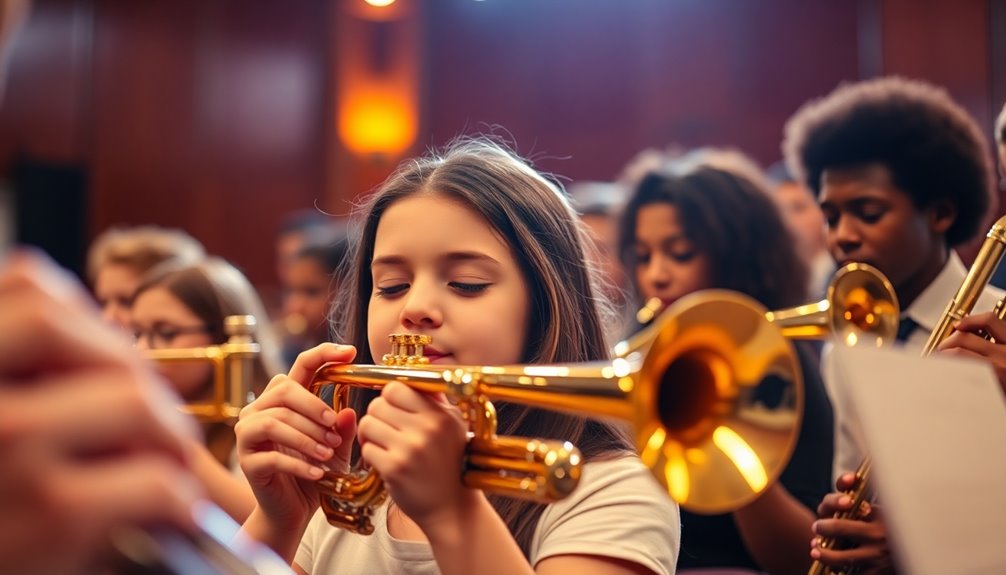
Participating in a band with your instrument can greatly enhance your musical skills. When you join a group of fellow musicians, you're not just playing notes together; you're improving your musical technique and developing a deeper understanding of music. Playing alongside others pushes you to refine your skills, as you'll need to stay in tune and in time with your bandmates.
One significant benefit is ear training. In a band setting, you'll become more attuned to different harmonies, rhythms, and dynamics. You'll learn to listen actively, identifying how your part fits within the larger musical framework. This skill is invaluable, as it helps you anticipate changes and adapt your playing accordingly.
Additionally, engaging with other musicians allows you to observe their techniques and styles. You'll pick up tips and tricks that can elevate your own performance. Whether it's a unique fingering method, a particular way to approach a solo, or how to maintain a steady rhythm, each band practice becomes a learning experience.
Moreover, the collaborative nature of playing in a band fosters a sense of accountability. You'll find yourself motivated to practice regularly, honing your instrument skills to contribute effectively. As you practice, remember the importance of essential flute techniques, which can help you further improve your performance.
As you grow together with your band, you'll not only enhance your musical abilities but also find a sense of belonging in the music community. So grab your instrument, join a band, and watch as your musical skills flourish!
Social Connections
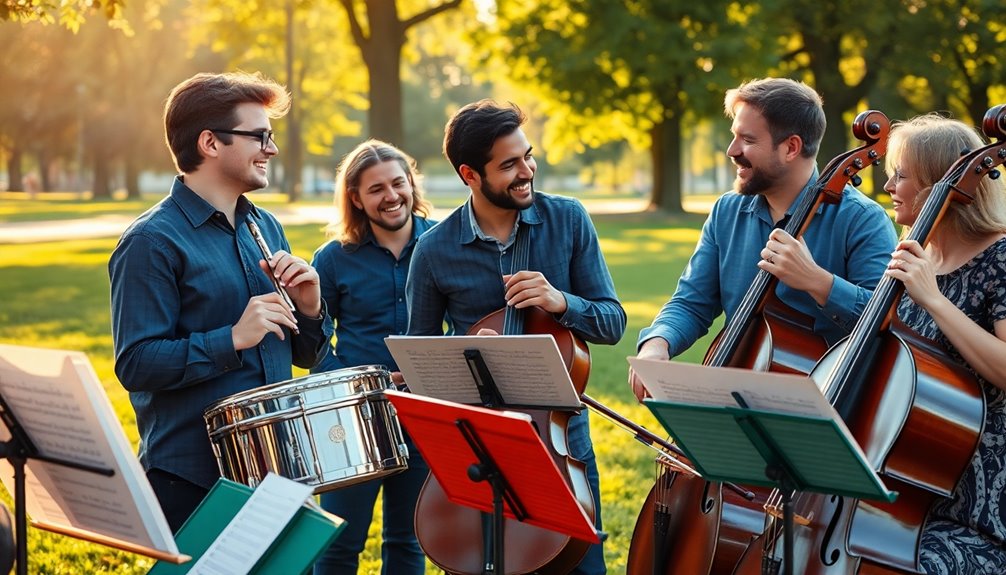
While honing your musical skills, you'll also find that joining a band creates invaluable social connections. Being part of a musical group isn't just about playing an instrument; it's about building relationships with like-minded individuals who share your passion.
These connections can lead to lasting friendships and enriching experiences. Here are some key benefits of social connections through band participation:
- Networking Opportunities: Bands often perform at various venues, giving you a chance to meet other musicians and industry professionals. You never know when a casual conversation could lead to your next gig or collaboration.
- Shared Experiences: The collective journey of rehearsals, performances, and even challenges fosters a sense of camaraderie. These shared moments create memories that you'll cherish forever.
- Support System: Being in a band means having a built-in support network. When you're feeling down or facing challenges, your bandmates understand and can offer encouragement.
- Diverse Friendships: Bands often bring together individuals from various backgrounds and experiences. This diversity enriches your social life and broadens your perspectives. Additionally, the shared passion for music creates a supportive and inspiring environment that enhances these connections.
Team Collaboration
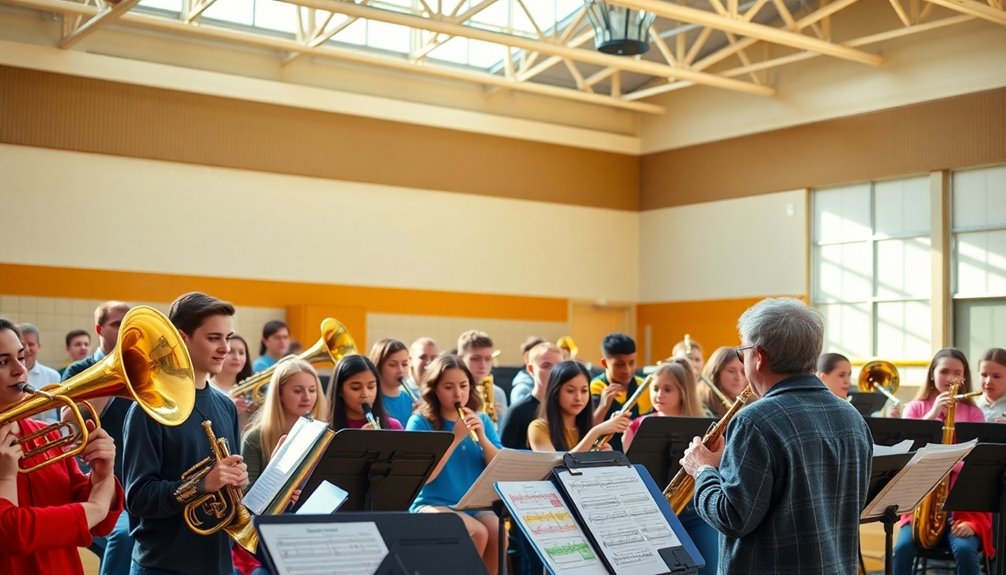
Joining a band not only fosters social connections but also enhances the power of team collaboration. When you participate in a band, you're part of a cohesive unit where each member plays a crucial role. This environment encourages you to develop your communication skills, as you need to express ideas, share feedback, and respond to others effectively. Clear communication is key to ensuring that everyone is on the same page, helping to create a harmonious sound that reflects your collective effort.
In a band, you often find opportunities to take on leadership roles, whether formal or informal. Leading a section, organizing rehearsals, or even mentoring newer members allows you to grow as a collaborator. These experiences teach you how to motivate others, delegate tasks, and work towards common goals. You'll learn that collaboration isn't just about playing notes together; it's about building trust and respect among your peers.
Moreover, facing challenges as a group—like learning a difficult piece or preparing for a performance—strengthens your ability to collaborate. You'll discover that overcoming obstacles together fosters a sense of belonging and camaraderie that's hard to find elsewhere. Participating in a band also helps develop qualities like perseverance and resilience that are essential for navigating the ups and downs of a musical journey.
Ultimately, the skills you gain through team collaboration in a band extend beyond music. They prepare you for various aspects of life, whether it's in school, work, or personal relationships.
Performance Opportunities

- Live Concerts: Performing at local venues or school events allows you to share your passion with friends, family, and the community. The applause and energy of a live audience can be incredibly motivating.
- Competitive Events: Participating in competitions can push you to refine your craft. You'll gain valuable feedback from judges and learn to handle the pressure of performing in front of an audience.
- Festivals: Many bands get the chance to play at music festivals, which can be a thrilling experience. The diversity of music and the chance to meet other musicians enrich your understanding of your art.
- Collaborative Shows: Teaming up with other bands for joint performances can provide unique experiences, allowing you to reach new audiences and share the stage with fellow musicians.
In addition to these opportunities, being part of a band also fosters essential repertoire that challenges and enhances your skills as a musician.
Personal Growth

Being part of a band does more than just enhance your musical skills; it also fosters significant personal growth. When you join a band, you engage in self-discipline development that's essential for both your musical journey and your everyday life. Practicing consistently and preparing for performances requires you to manage your time effectively.
You'll find that these skills translate into other areas, helping you become more organized and focused.
Moreover, participating in a band creates numerous opportunities for confidence building. As you play in front of your peers and audience, you'll confront the natural nerves that come with performing. Each time you step on stage, you push through those fears, gaining assurance in your abilities.
This newfound confidence spills over into other aspects of your life, allowing you to tackle challenges with a more positive mindset.
Additionally, being part of a band fosters a sense of belonging. You'll form connections with your bandmates, sharing the highs and lows of rehearsals and performances.
This camaraderie not only strengthens your musical experience but also nurtures your emotional well-being. You'll learn to communicate effectively and collaborate with others, which is invaluable in any social setting. Participating in a band also enhances your overall musicianship, as seen in the Standard of Excellence Book 1, which provides a comprehensive method for developing essential techniques.
Diverse Musical Styles

- Jazz Improvisation: Jazz encourages creativity and spontaneity. You'll learn to express yourself through improvisation, which can be liberating and fun.
- Classical Techniques: Engaging with classical music helps you develop your technical skills. These techniques serve as a solid foundation for any musician, enhancing your overall performance.
- Rock and Pop: Playing contemporary music can energize your practice. It often involves catchy rhythms and melodies that resonate with a wide audience, allowing you to connect with fellow band members and listeners alike.
- World Music: Exploring music from different cultures introduces you to unique rhythms and scales. This diversity enriches your playing and opens doors to new collaborations. Additionally, participating in band settings allows you to experience the versatility of the flute, which plays a significant role in different music genres across the globe.
Increased Motivation
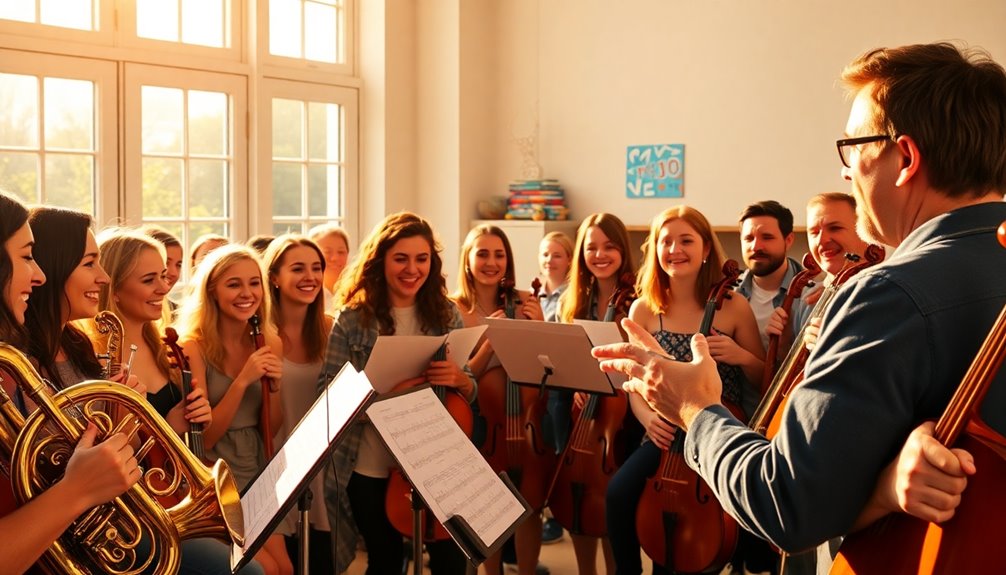
One of the most rewarding aspects of participating in a band is the increased motivation it brings to your musical journey. When you join a group of like-minded musicians, you're surrounded by individuals who share your passion for music. This camaraderie naturally sparks a sense of accountability that can elevate your practice sessions and overall skill level.
Setting goals becomes an exciting part of being in a band. You're likely to find yourself inspired by your bandmates, pushing you to aim higher and work harder. Whether it's preparing for a performance or mastering a challenging piece, having clear goals helps you focus your efforts. You'll notice that you're more driven to practice regularly, knowing that your contributions matter to the group.
Additionally, practice accountability kicks in when you're part of a band. You're not just playing for yourself anymore; your fellow musicians are counting on you. This shared responsibility encourages you to show up, ready to give your best. When you know others are relying on you, it's tough to skip practice or let your skills slide.
In essence, participating in a band fosters an environment where motivation thrives. You'll find yourself not only improving as a musician but also feeling a deeper connection to your craft. Embrace this opportunity to grow, set goals, and hold yourself accountable. You're not just playing music; you're becoming part of something bigger, and that's incredibly motivating. Furthermore, the experience of collaborating with others enhances your community engagement in music, providing valuable feedback and support along the way.
Community Engagement
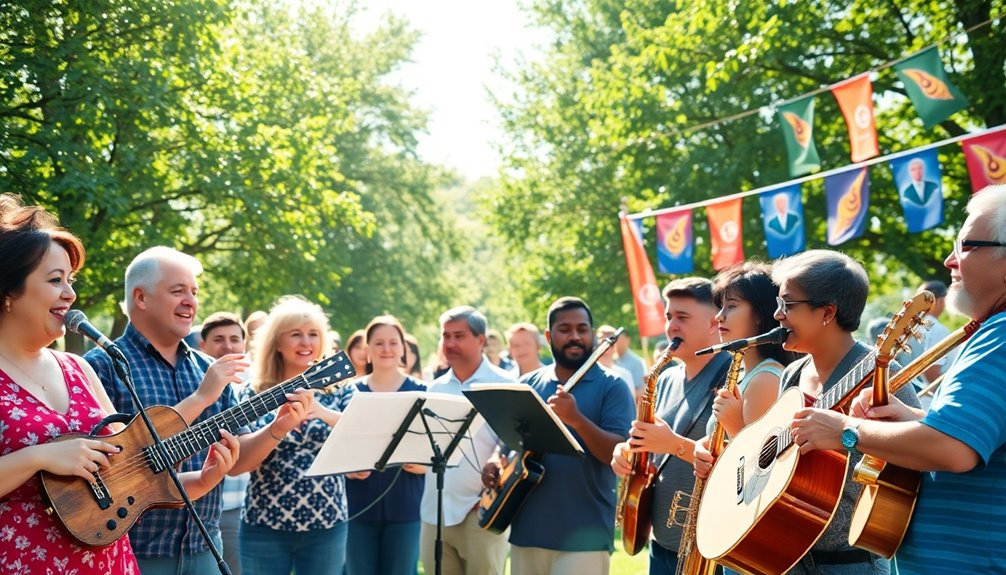
Community engagement is a vital aspect of participating in a band, as it connects musicians not only to each other but also to the wider community. When you play in a band, you're not just making music; you're contributing to something bigger. This involvement fosters a sense of belonging, which is essential for personal and collective growth.
Here are some ways band participation enhances community engagement:
- Community Outreach: Bands often perform at local events, schools, and community centers, bringing music to those who mightn't otherwise have access. This outreach can inspire the next generation of musicians.
- Cultural Enrichment: Through diverse musical styles and genres, you help share your culture and learn about others. This exchange enriches the community, fostering appreciation for different backgrounds and traditions.
- Collaboration with Local Organizations: Many bands partner with nonprofits and community groups for events. These collaborations can raise funds and awareness for important causes, strengthening community bonds.
- Building Local Identity: When you participate in a band, you're contributing to the cultural fabric of your area. Your performances can create a unique local identity, making your community stand out and thrive. Additionally, being part of a band allows musicians to engage in structured lessons and exercises, enhancing their skills while connecting with others.
Lifelong Friendships
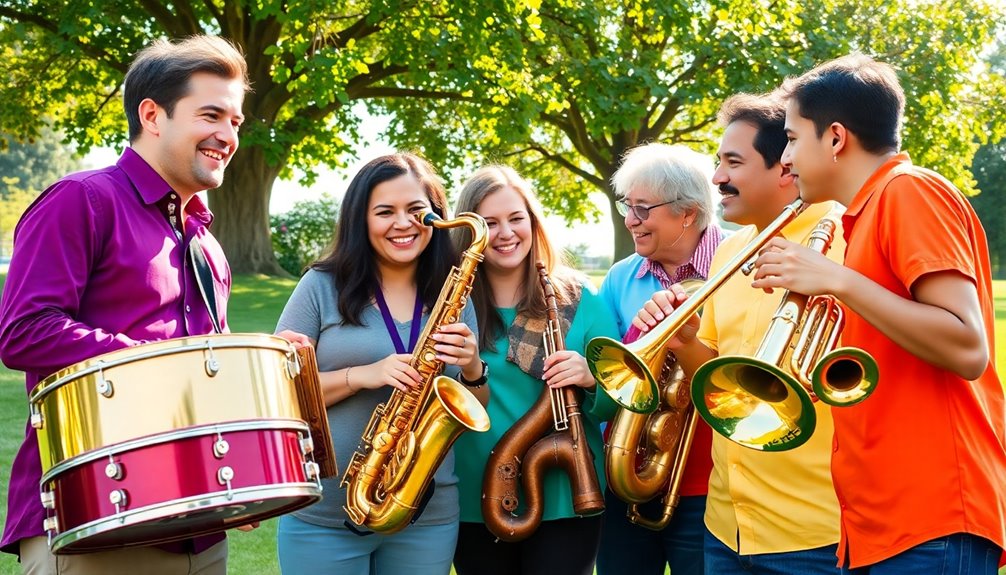
While you might join a band for the love of music, the friendships you build along the way often become one of the most rewarding aspects of your experience. Being part of a band creates a unique environment where you and your fellow musicians share experiences that deepen your connections.
Whether it's rehearsing for a performance, traveling to gigs, or celebrating a successful show, these moments forge memories that you'll cherish for years to come. As you navigate the ups and downs of band life together, you'll discover that the challenges you face can strengthen your relationships.
Working towards a common goal fosters teamwork and camaraderie, leading to lasting bonds that extend beyond the music. You'll find yourself relying on each other for support, encouragement, and even a good laugh during stressful times.
Moreover, the diversity of personalities and backgrounds in a band enriches your social life. You'll meet people you might never have crossed paths with otherwise, and these friendships can offer new perspectives and experiences that enhance your life.
The shared passion for music creates a strong foundation for connections that often last a lifetime. In essence, participating in a band isn't just about honing your musical skills; it's about building a community. Additionally, upgraded headjoints can improve your sound, making performances even more enjoyable and memorable.
The friendships formed will provide you with a sense of belonging and support, making your time in the band truly special. So embrace those connections; they'll be a source of joy in your life long after the last note fades away.
Creative Expression
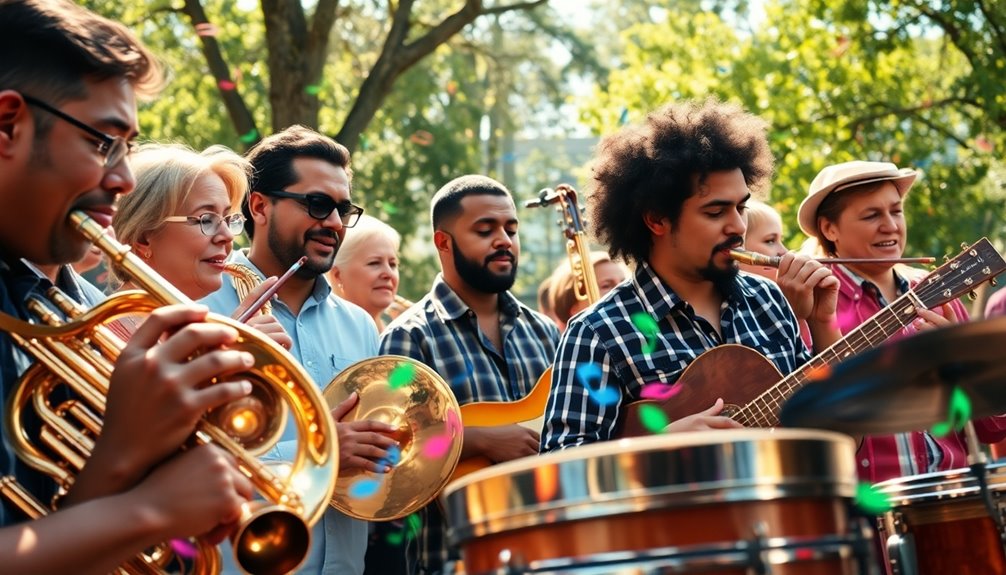
The friendships formed in a band often ignite a spark of creative expression that fuels your musical journey. When you collaborate with others, you're not just playing notes; you're weaving an intricate tapestry of sound and emotion.
This shared experience encourages you to explore improvisational techniques that breathe life into your music, creating an environment where everyone can express themselves freely.
Here are four ways band participation enhances your creative expression:
- Collaboration: Working with others allows you to combine different styles and ideas, leading to unique musical creations.
- Feedback: Constructive criticism from bandmates can help refine your skills and push your creative boundaries.
- Emotional Storytelling: Music is a powerful medium for conveying feelings. Playing alongside others enables you to share and amplify emotional narratives within your songs.
- Improvisation Opportunities: Jamming with fellow musicians fosters spontaneity, allowing you to experiment and discover new sounds in real-time. Additionally, engaging in breathing exercises before playing can enhance your control and expression, allowing for a deeper connection with your bandmates.
Frequently Asked Questions
What Instruments Are Typically Allowed in Band Participation?
In band participation, you'll typically find a variety of instruments that create a rich sound together.
Woodwind instruments like flutes, clarinets, and saxophones add a melodic layer, while brass instruments such as trumpets, trombones, and tubas provide depth and power.
No matter what you play, each instrument contributes to the whole, fostering a sense of belonging and teamwork.
How Much Time Commitment Is Required for Band Participation?
Imagine standing under the bright lights, surrounded by a sea of musicians, all united in harmony.
For band participation, you'll typically commit several hours each week. Practice schedules often involve daily individual practice, while rehearsals might occur two to three times a week.
Embrace this commitment, as it not only hones your skills but also fosters camaraderie. You'll find that the time spent together strengthens your bond with fellow musicians, making it all worthwhile.
Are There Age Restrictions for Joining a Band?
There aren't strict age restrictions for joining a band; it often depends on the type of ensemble.
Youth bands typically welcome younger musicians, while adult ensembles cater to older players.
You'll find a welcoming community in both, where you can share your passion for music.
Whether you're a beginner or experienced, there's a place for you.
Don't hesitate to join! You'll connect with others and create amazing music together.
Can Beginners Join a Band, or Is Prior Experience Necessary?
Absolutely, beginners can join a band! It's not like you need to be a Mozart to start.
In fact, being a beginner offers incredible benefits, like fresh learning opportunities and the chance to grow alongside others.
You'll find that collaborating with more experienced musicians helps you improve faster and feel a sense of belonging.
What Are the Costs Associated With Band Participation?
When you think about the costs of joining a band, consider both direct expenses and ongoing commitments. You might face fees for uniforms, sheet music, and travel.
Don't forget instrument maintenance; keeping your gear in shape is essential.
However, many bands offer fundraising options to help cover these costs, making participation more accessible. Embrace these opportunities, and you'll not only manage expenses but also feel a deeper sense of belonging within the band.
Conclusion
Joining a band with your instrument opens a vibrant world of opportunities. Imagine the thrill of blending your notes with others, creating a rich tapestry of sound that resonates in the air. You'll not only hone your skills but also forge deep connections and friendships that last a lifetime. Each practice session and performance becomes a brushstroke on your musical canvas, painting a journey of growth, collaboration, and joy. Embrace this adventure—your instrument is your ticket to an unforgettable experience!






